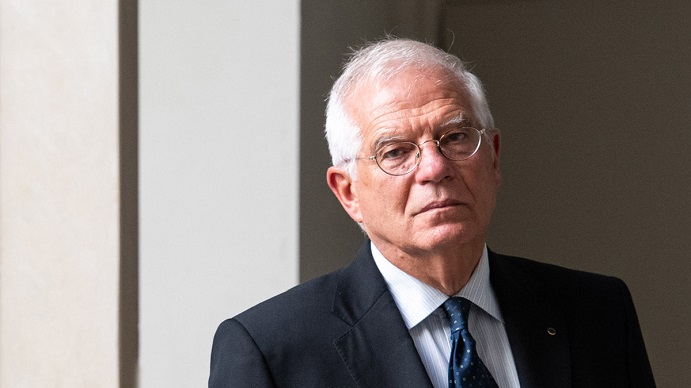David Cronin
The Electronic Intifada / October 7, 2020
There has been an element of pantomime in the European Union’s relations with Israel for almost two decades.
Every so often a politician or pressure group supporting Israel accuses the EU of funding “terrorism” by Palestinians. “Oh no, we’re not,” an EU representative responds – or words to that effect – to be told “oh yes, you are” by the accuser.
Usually the shouting match continues in that vein for some time, peters out and resumes when nobody is really expecting it. The audience hears plenty of insinuation but no hard facts are produced.
Although the EU has been highly sensitive to criticism, it has kept on financing Palestinians who undertake work of which Israel and its lobbying network disapprove.
All that appears to be changing.
In the recent past, the Brussels bureaucracy has allowed the pantomime to influence policy. The result is that campaigners for Palestinian rights are now finding it harder to obtain funds.
Far right politicians now play a prominent role in the pantomime.
I made a freedom of information request seeking correspondence addressed to Josep Borrell, the EU’s foreign policy chief, on aid for Palestinian organizations. Borrell’s office identified just two letters he had received about this matter over the past year.
Both were from cross-party groupings within the European Parliament. One grouping was dominated by far right politicians, the other could be considered more centrist.
The contents of these letters were broadly similar yet a difference can be detected in Borrell’s replies. He went further toward appeasing the grouping dominated by the far-right, than the one mainly comprised of centrists.
Replying to the grouping dominated by the far-right, Borrell insisted that the Brussels bureaucracy has never received “any substantiated report indicating any suspicion of deviation of funds for terrorist purposes in the Palestinian territories.” Borrell nonetheless outlined an extreme form of political vetting to which the EU is subjecting Palestinians.
Borrell referred to clauses introduced recently into contracts between the EU and its aid recipients. “These rules make the participation of entities, individuals or groups affiliated, linked to or supporting terrorist organizations incompatible with any EU funding,” he stated.
Blacklisted
Huge numbers – perhaps even the majority – of Palestinians would be deemed ineligible if Borrell’s approach is strictly applied.
The EU has designated every significant group resisting Israel’s brutal occupation as “terrorist.”
It has blacklisted Hamas, Islamic Jihad and the Popular Front for the Liberation of Palestine.
A small distinction has been drawn for Fatah, which wields the most clout in the Palestinian Authority. While Fatah’s political wing has been kept off the blacklist, its armed wing – al-Aqsa Martyrs’ Brigades – is included.
Under international law, Palestinians have the right to resist the occupation of their land. Borrell is not only denying them that right, he is echoing the viewpoint of Israel, which brands all resistance that it encounters as “terrorism.”
By issuing his reply, Borrell was underscoring that the EU has decided at the highest level not to tolerate Palestinians who do not obey their oppressors.
His comments were at odds with the more nuanced line taken by Sven Kühn von Burgssdorff, the EU’s envoy to the occupied West Bank and Gaza, earlier this year.
Von Burgssdorff had told a network of Palestinian organizations that individuals who sympathized with blacklisted groups may take part in aid projects provided that those individuals were not themselves sanctioned by the EU.
Palestinian lives don’t matter
The aforementioned letter from the grouping dominated by the far-right was drafted by two members of the European Parliament: Anna Fotyga from Poland’s Law and Justice – a party that dabbles in Holocaust denial – and Charlie Weimers from the Sweden Democrats.
That duo appears quite relaxed about certain types of violence. Both have opposed a call made by the European Parliament for restrictions on arms sales to Saudi Arabia.
By taking that position, they are enabling the continuation of a war in Yemen that has caused one of the world’s worst humanitarian crises.
Weimers has indicated that he sympathizes with the white supremacists making US politics increasingly toxic.
He has backed moves by the Trump administration to stop spending federal money on anti-racist training. While depicting Black Lives Matter activists as hooligans, Weimers has tweeted “stand up for our civilization.”
Like many racists, Weimers has used the slogan “all lives matter” – a disgusting diversionary tactic when Black people are being killed by police.
Palestinian lives do not seem to matter for Weimers. He wants the European Union to cease aiding UNRWA, the UN agency for Palestine refugees. The cutbacks he favours would potentially deny healthcare and education to millions of Palestinians.
The real agenda here is that many of Israel’s supporters do not want Palestinians to receive any funding at all. Any initiative aimed at preserving Palestinian culture or protecting Palestinian livelihoods tends to encounter objections from Israel’s lobby.
Something positive may nonetheless emerge from how Palestinian human rights groups are being starved of funds. No longer reliant on grants from Brussels, these groups will be free – provided they can find money from elsewhere – to expose the myriad ways in which the EU abets Israel’s crimes.
If that happens, then the curtains might finally come down on the pantomime.
David Cronin is an associate editor of The Electronic Intifada; his books include Balfour’s Shadow: A Century of British Support for Zionism and Israel and Europe’s Alliance with Israel: Aiding the Occupation













